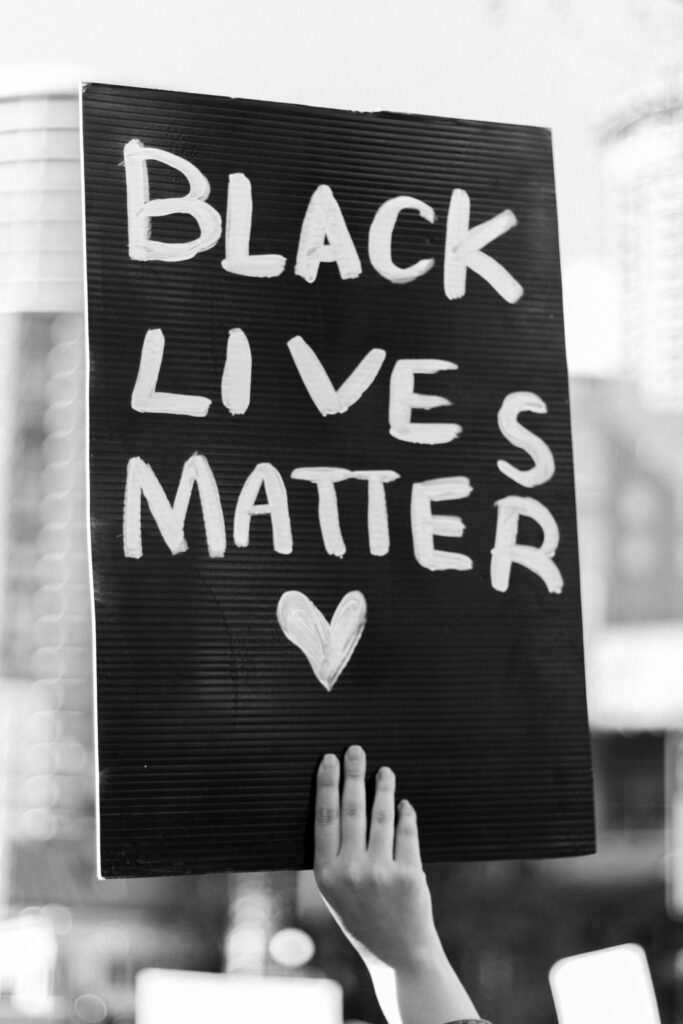Anti-racism and Criminal Justice Reform Resources
“My work with the poor and the incarcerated has persuaded me that the opposite of poverty is not wealth; the opposite of poverty is justice.”
—Bryan Stevenson
A message from Katharyne Mitchell, dean of Social Sciences.
In the social sciences we are all too aware of the structural forms of violence inflicted on communities of color in society, as well as the endemic anti-Blackness that pervades our US history and culture. The current constellation of events highlights, once again, the racism and conditions of white supremacy Black people are forced to negotiate on a daily basis.
In the division we can and must continue to fight this violence and injustice through our research and our actions. As Angela Davis (UC Santa Cruz Distinguished Professor Emerita) has noted, “In a racist society it is not enough to be non-racist, we must be anti-racist.” I am proud to be part of a community where the power and importance of her words continue to animate our work. While our research, teaching and commitments to racial justice are never enough, they matter. Thank you all for the work you do. (May 2020)
More voices from UC Santa Cruz.
UCSC Antiracism Programs, Projects and Resources – UCSC is committed to working with all campus partners to identify mechanisms to dismantle structural racism.
May 1, 2021- Some reflections on community/police relations at UCSC and beyond, by John Brown Childs, Professor emeritus Sociology, UCSC & Enrolled member of the Massachusetts Tribe of Indians at Ponkapoag
March 17, 2021- AA/PIRC Statement on Anti-Asian Violence and Racism – UCSC Asian American/Pacific Islander Resource Center statement from director Caz Salamanca
Sept. 8, 2020- Antiracist efforts must be ongoing, ever-improving, by Teresa Maria Linda Scholz, Chief Diversity Officer, and Jody Greene, Associate Vice Provost for Teaching and Learning
Aug. 12, 2020- Anti-racist Problem-solving, by Dr. Aaron Jones, Interim Director of Educational Opportunity Programs
June 5, 2020- An Open Letter to UC Santa Cruz, Committee on Affirmative Action and Diversity (CAAD)
June 1, 2020- Solidarity; Black Lives Matter, Staff Advisory Board (SAB)
May 29, 2020- Statement on George Floyd, Chancellor Cynthia Larive, UCSC
May 2020 Statement from Director Shonté Thomas, UCSC African American Resource and Cultural Center
Statement on Police Killings of Black Americans, Educational Opportunity Programs (EOP)
Get informed.
National Thought Leaders
Bryan Stevenson
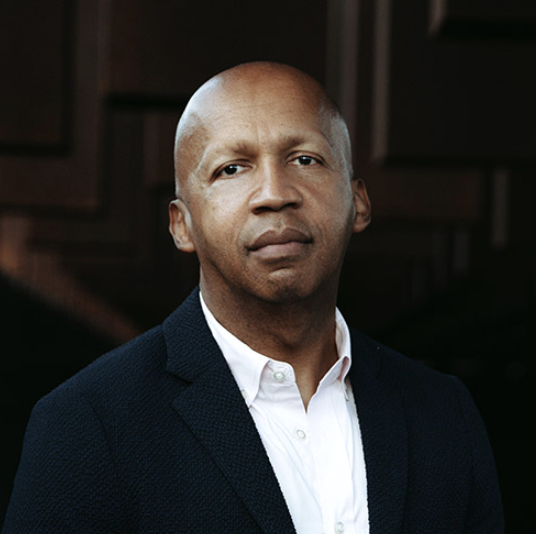
Bryan Stevenson is the founder and executive director of the Equal Justice Initiative. He is a widely acclaimed public interest lawyer who has dedicated his career to helping the poor, the incarcerated, and the condemned.
(photo and bio via eji.org)
- Current Thoughts: Bryan Stevenson on the Frustration Behind the George Floyd Protests
- Book: Just Mercy
- Feature Film: Just Mercy
- Documentary: True Justice
- Social Media: Twitter | Facebook | Instagram
- TED Talk: We need to talk about an injustice
Angela Davis
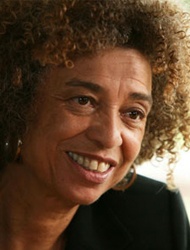
Angela Davis is known internationally for her ongoing work to combat all forms of oppression in the U.S. and abroad. She has been active as a student, teacher, writer, scholar, and activist/organizer. She is a living witness to the historical struggles of the contemporary era.
(photo and bio via ucsc.edu)
- Interview: Democracy Now with Amy Goodman, June 12, 2020
- Book: Are Prisons Obsolete?
- Social Media: Facebook
- Video: Abolishing police is not just about dismantling. It’s also about building up
Michelle Alexander
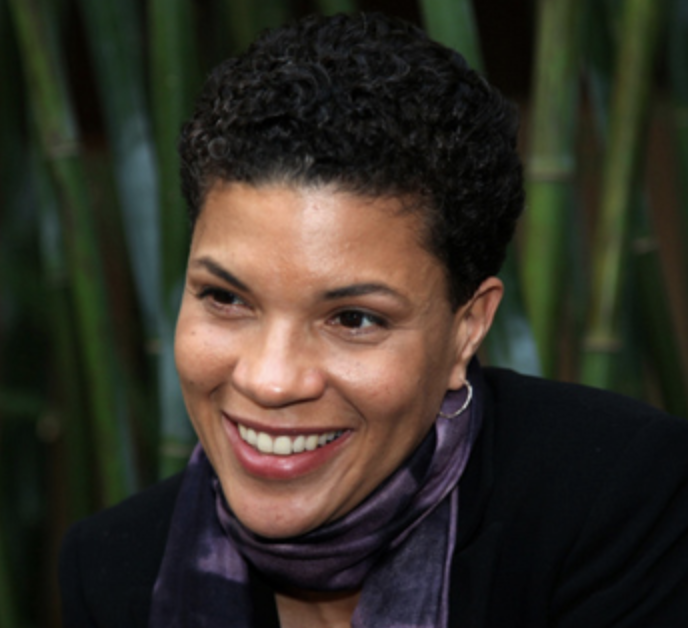
Michelle Alexander is a highly acclaimed civil rights lawyer, advocate, legal scholar and author of The New Jim Crow: Mass Incarceration in the Age of Colorblindness — the bestselling book that helped to transform the national debate on racial and criminal justice in the United States.
(photo and bio via newjimcrow.com)
- Current Thoughts: America, This Is Your Chance
- Book: The New Jim Crow: Mass Incarceration in the Age of Colorblindness
- Social Media: Twitter
- TED Talk: Future of Race in America
Patrisse Cullors, Alicia Garza, and Opal Tometi – BLM co-founders
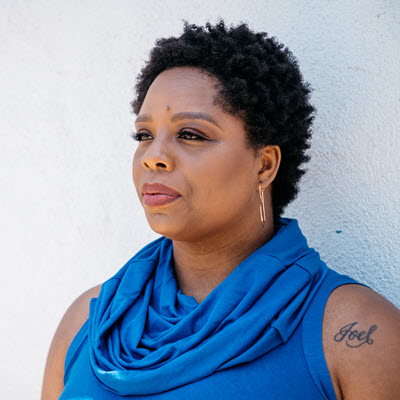
Artist, organizer, educator, and popular public speaker, Patrisse Cullors is a Los Angeles native and Co-Founder of the Black Lives Matter Global Network and Founder of grassroots Los Angeles based organization Dignity and Power Now. Cullors’ work for Black Lives Matter recently received recognition in TIME Magazine’s 2020 100 Women of the Year project. Cullors is a New York Times bestselling author of When They Call You a Terrorist: A Black Lives Matter Memoir (2018). She is also the Faculty Director at Arizona’s Prescott College of a new Social and Environmental Arts Practice MFA program that she has developed. In 2019, Patrisse joined Freeform’s Good Trouble Season Two as a staff writer and actor. She has continued writing for its third season. For the last 20 years, Cullors has been on the frontlines of criminal justice reform and led Reform LA Jails’ “Yes on R” campaign, a ballot initiative that passed by a 73% landslide victory in March 2020. (photo and bio via blacklivesmatter.com)
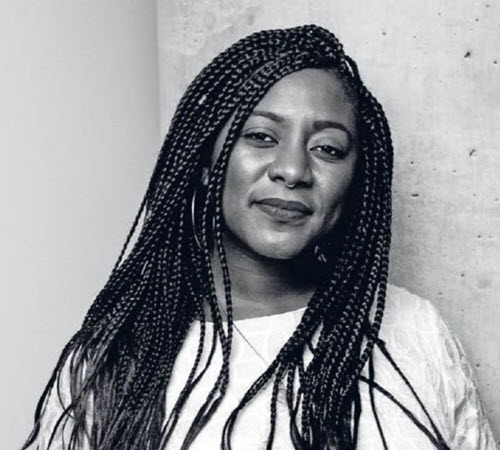
Alicia Garza is an Oakland-based organizer, writer, public speaker, and freedom dreamer who is currently the Special Projects Director for the National Domestic Workers Alliance, the nation’s leading voice for dignity and fairness for the millions of domestic workers in the United States. Garza, along with Opal Tometi and Patrisse Cullors, also co-founded Black Lives Matter, a globally recognized organizing project that focuses on combating anti-Black state-sanctioned violence and the oppression of all Black people.
Since the rise of the BLM movement, Garza has become a powerful voice in the media. Her articles and interviews have been featured in Time, Mic, The Guardian, Elle.com, Essence, Democracy Now!, and The New York Times.
Most important, as a queer Black woman, Garza’s leadership and work challenge the misconception that only cisgender Black men encounter police and state violence. While the tragic deaths of Trayvon Martin and Mike Brown were catalysts for the emergence of the BLM movement, Garza is clear: In order to truly understand how devastating and widespread this type of violence is in Black America, we must view this epidemic through a lens of race, gender, sexual orientation, and gender identity.
(photo and bio via blacklivesmatter.com)
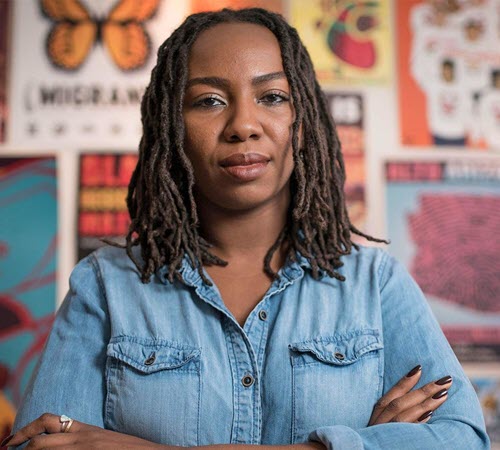
Opal Tometi is a New York-based Nigerian-American writer, strategist, and community organizer. Opal is a co-founder of #BlackLivesMatter. The historic political project was launched in the wake of the murder of Trayvon Martin to explicitly combat implicit bias and anti-Black racism and to protect and affirm the beauty and dignity of all Black lives. Opal is credited with creating the online platforms and initiating the social media strategy during the project’s early days. The campaign has grown into a national network of approximately 40 chapters. In 2016, in recognition of their contribution to human rights, Opal Tometi and the #BlackLivesMatter co-founders received an honorary doctorate degree, BET’s Black Girls Rock Community Change Agent Award, recognition among the world’s fifty greatest leaders by Fortune and POLITICO magazines, and the first ever Social Movement of the Year Award from the Webbys.
Opal is currently at the helm of the country’s leading Black organization for immigrant rights, the Black Alliance for Just Immigration (BAJI). Founded in 2006, BAJI is a national organization that educates and advocates to further immigrant rights and racial justice together with African-American, Afro-Latino, African, and Caribbean immigrant communities. As the Executive Director at BAJI, Opal collaborates with staff and communities in Los Angeles, Phoenix, New York, Oakland, Washington DC, and communities throughout the Southern states. The organization helped win family reunification visas for Haitians displaced by the 2010 earthquake. BAJI is an award-winning organization with recognition by leading institutions across the country.
(photo and bio via blacklivesmatter.com)
- Movements:
- Black Lives Matter
- Movement for Black Lives
- Dignity & Power Now, (founded and chaired by Patrisse Khan-Cullors)
- Black Futures Lab (Alicia Garza, Principal)
- opaltometi.org (Opal Tometi’s web-site)
- Social Media:
- TED Talk: Interview with Alicia Garza, Patrisse Cullors, and Opal Tometi
Phillip Atiba Goff
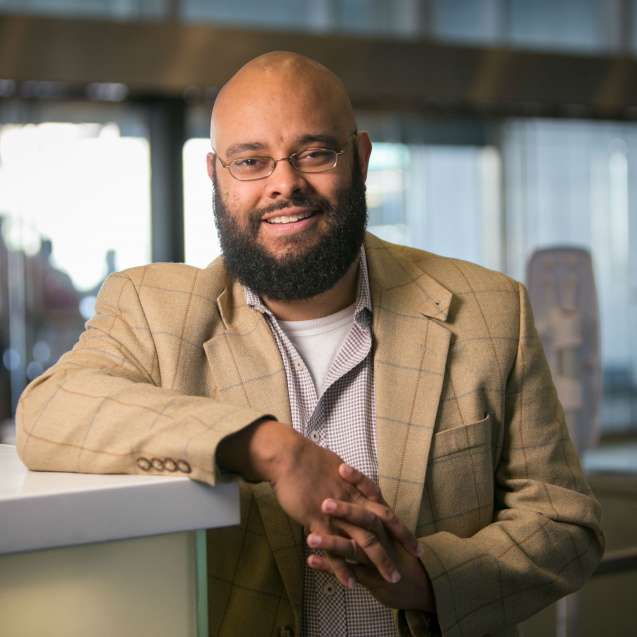
Phillip Atiba Goff is the Co-founder and CEO of the Center for Policing Equity, and a Professor of African-American Studies and Psychology at Yale University. He received his AB from Harvard and PhD in Psychology from Stanford. He quickly became a national leader in the science of racial bias by pioneering scientific experiments that exposed how our minds learn to associate Blackness and crime implicitly—often with deadly consequences.
This research led Dr. Goff to co-found the Center for Policing Equity (CPE), a university research center now supported by the 501(c)(3) Policing Equity organization. Created at UCLA, where Dr. Goff took tenure, the Center grew to be the world’s largest research and action think tank on race and policing. CPE also hosts the world’s largest collection of police behavioral data in the National Science Foundation-funded National Justice Database.
This database now serves as a tool to reduce burdensome and inequitable policing through scientific analyses. Dr. Goff has won two American Psychological Association early career awards, the Association for Psychological Science Rising Star award, and the National Organization of Black Law Enforcement Executive’s Lloyd G. Sealy Award, among many others. He regularly appears on cable news, provides congressional testimony, and was a panelist for President Obama’s Task Force on 21st Century Policing.
(photo and bio via policingequity.org)
- Center for Policing Equity
- Social Media: Twitter | Instagram
- TED Talk:
Reading Lists and Resources
“By not running from the books that pain us, we can allow them to transform us. I ran from antiracist books most of my life. But now I can’t stop running after them — scrutinizing myself and my society, and in the process changing both.”
-I.X. Kendi
- UCSC African American Resource and Cultural Center, Director Thomas’s book list (starts on bottom of page 2)
- New Era of Public Safety Toolkit (The Leadership Conference on Civil and Human Rights report, stemming from the 2014 Task Force on 21st Century Policing)
UC Santa Cruz Faculty Research
This is a growing list. Please send recommended research publications to transform@ucsc.edu
- Brown, Michael K. (1981). Working the Street: Police Discretion and the Dilemmas of Reform. Russell Sage Foundation. Free download available here.
- Casanova, S., McGuire, K., & Martin, M. (2018). “Why you throwing subs?”: An exploration of community college students’ immediate responses to microaggressions. Teachers College Record, 120(9).
- Davis, Angela (2003). Are Prisons Obsolete? Seven Stories Press.
- Ellison, E., & Langhout, R.D (2016). Collaboration across difference: A joint autoethnographic examination of power and whiteness in the higher education anti-budget cuts movement. Race, Ethnicity, and Education, 19(6), 1319-1334.
- Haney, Craig (2020). Criminality in Context: The Psychological Foundations of Criminal Justice Reforms. American Psychological Association.
- Haney, Craig (2002). Making law modern: Toward a contextual model of justice. Psychology, Public Policy, and Law, 8(1), 3–63.
- Read the UCSC news story here.
- Hanink, Peter A., Verma, Anjuli, Ward, Geoff K. (2020). “Can We Trust the Police to Intervene in Fellow Officer Misconduct?” JURIST Legal News & Research Services, Inc.
- McGuire, K. M., Casanova, S., & Davis III, C. H. (2016). “I’m a Black female who happens to be Muslim”: Multiple Marginalities of an Immigrant Black Muslim Woman on a Predominantly White Campus. The Journal of Negro Education, 85(3), 316-329.
- Mukherjee, Roopali, Banet-Weiser, Sarah and Gray, Herman (eds.) (2019). Racism Postrace. Duke University Press.
- Verma, Anjuli. (2016). A Turning Point in Mass Incarceration? Local Imprisonment Trajectories and Decarceration under California’s Realignment. The Annals of the American Academy of Political and Social Science, 664: 108-135.
- Verma, Anjuli. (2015). The Law-Before: Legacies and Gaps in Penal Reform. Law & Society Review, 49(4): 847-882.
UC Santa Cruz Courses
If students, faculty, or staff are interested in exploring these issues more deeply, consider registering for one of the following courses (audit options may be available).
- Critical Race and Ethnic Studies Courses
- Latin American and Latino Studies Courses
- Diversity & Inclusion Certificate Program
- Social Justice, Society, and Policy (PSYC 211B)
- Race & Justice in America (POLI/LGST 121)
- The Power to Punish (POLI/LGST 182)
- Law, Crime, and Social Justice (LGST 123)
- Inequality and Law (LGST 130)
- Race & Criminal Justice (LGST 128)
- Power, Culture, and the Federal Bureau of Investigation (HIST 190U)
- Power and Representation in Media (KRSG 2)
- Latinx Psychology (PSYC 144)
- Psychology of Immigration (PSYC 159I)
- Intersectionality: Interdisciplinary Perspectives on Inequality, Power, and Identity (PSYC 213)
- Race, Class, And Culture In Education (EDUC 181)
- Urban Education (EDUC 164)
- Language, Diversity, And Learning (EDUC 140)
- Critical Perspectives On Education (EDUC 295)
Videos and Documentaries
Some require subscriptions or payments.
- One Night in Miami…
- Black America since MLK and still I rise
- Reconstruction: America after the Civil War
- Black Feminism & the Movement for Black Lives: Barbara Smith, Reina Gossett, Charlene Carruthers
- TED: Talks to Help You Understand Racism in America Playlist
- Bryan Stevenson: We need to Talk about an Injustice
- The Audacious Project
- 13th
- I am Not Your Negro
- Systemic Racism Explained
- Whose Streets?
- Ruth Wilson Gilmore: Covid-19, Decarceration, and Abolition
- Take this Hammer (the Director’s Cut)
- Race at a Boiling Point: The Fire This Time
- Race at Boiling Point: Movement We Make
Podcasts
- 1619 (New York Times)
- Momentum: A Race Forward Podcast
- Pod for the Cause (from the Leadership Conference on Human and Civil Rights)
- Code Switch (NPR)
- Deconstructed: How to Fix the Criminal (In)Justice System
- Seeing White
- Ear Hustle
Lists Compiled by Others
- Anti-Racist Action Resources compiled by the Society for Community Research and Action.
- Anti-Racist Resources compiled by Professor Suzana Loza, Hampshire College.
- UCSC Resource Sheet compiled by Colleges Nine and Ten.
- Black Lives Matter: A Resource Guide compiled by Santa Cruz Museum of Art & History (MAH)
- Black-owned independent bookstores compiled by Literary Hub
- How to Be Anti-Racist: A Social Worker’s Perspective by University of Southern California, Master of Social Work Program
- Confronting Prejudice: How to Protect Yourself and Help Others by Pepperdine University, Online Master of Psychology program
- Public Health Resources for Understanding Environmental Racism compiled by Public Health Degrees powered by 2U, INC.
Take action.
Organizations
- UCSC African American Resource & Cultural Center
- Black Lives Matter
- Movement for Black Lives (M4BL)
- Equal Justice Initiative
- Race Forward
- The Sentencing Project
- Campaign Zero
- Color of Change
- The ACLU
- Center for Policing Equity
- NAACP Legal Defense Fund
- The Opportunity Agenda
- CA Alliance for Youth & Community Justice
- Member Organizations (CA Alliance for Youth & Community Justice)
- The Marshall Project (non-profit journalism about criminal justice)
- Critical Resistance
- Santa Cruz Barrios Unidos
- Santa Cruz County Community Coalition to Overcome Racism (SCCCCOR)
- Santa Cruz Resource Center for Nonviolence
- Pajaro Valley Prevention & Student Assistance, Inc. Restorative Justice Programs
- BARWE (Building Anti-Racist White Educators)
- Ella Baker Center for Human Rights
- Participatory Defense
- SURJ (Showing Up for Racial Justice) Bay Area Chapter
Contact Your Representative
Sign Petitions. Donate. Share.
Help us learn.
We strive to be constantly learning and evolving. Please send us additional criminal justice reform resources to include on this page.
